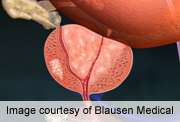In men with recurrent prostate cancer following radiation therapy, magnetic resonance imaging-guided focal cryoablation is feasible and seems safe, according to a study published in the August issue of Radiology.
(HealthDay)—In men with recurrent prostate cancer following radiation therapy, magnetic resonance imaging (MRI)-guided focal cryoablation is feasible and seems safe, according to a study published in the August issue of Radiology.
Joyce G.R. Bomers, from Radboud University Nijmegen Medical Centre in the Netherlands, and colleagues studied 10 consecutive patients with histopathologically proved recurrent prostate cancer after radiation therapy, without evidence of distant metastases. While patients were under general anesthesia, a urethral warmer was inserted, followed by transperineal insertion of cryoneedles during real-time MRI and insertion of a rectal warmer. MRI guidance was used to continuously monitor ice ball growth. Two cycles of freezing and thawing were conducted. Follow-up included a urologist visit, prostate-specific antigen level measurement, and multiparametric MRI at three, six, and 12 months.
The researchers found that all patients were successfully treated, although in one patient, the urethral warmer could not be inserted and the procedure was cancelled, but was repeated successfully two months later. Urinary retention was observed in another patient. A local recurrence or remnant tumor was identified at six months in two patients and at 12 months in another patient. Successful retreatment with MRI-guided focal cryoablation occurred in these three patients.
"MR imaging-guided focal cryoablation of recurrent prostate cancer after radiation therapy is feasible and safe," the authors write. "Initial results are promising; however, longer follow-up is needed and more patients must be studied."
One author disclosed financial ties to the medical technology industry.
More information:
Abstract
Full Text (subscription or payment may be required)
Journal information: Radiology
Copyright © 2013 HealthDay. All rights reserved.


















